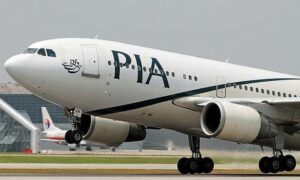 Pakistan owes $83 million to international airlines. The money sits locked in the country’s accounts while foreign carriers wait for payments they earned from ticket sales and operations. It is revenue that airlines need to pay their own bills and keep flying. The International Air Transport Association says Pakistan is one of just ten countries holding back over 80 percent of the $1.3 billion in blocked airline funds worldwide. Pakistan reduced its backlog from $311 million to $83 million, but that still leaves dozens of airlines unable to access money they rightfully earned in Pakistani markets.
Pakistan owes $83 million to international airlines. The money sits locked in the country’s accounts while foreign carriers wait for payments they earned from ticket sales and operations. It is revenue that airlines need to pay their own bills and keep flying. The International Air Transport Association says Pakistan is one of just ten countries holding back over 80 percent of the $1.3 billion in blocked airline funds worldwide. Pakistan reduced its backlog from $311 million to $83 million, but that still leaves dozens of airlines unable to access money they rightfully earned in Pakistani markets.
Willie Walsh, IATA’s Director General says that the airlines need this money to cover expenses and maintain operations. When governments block these payments, they violate bilateral agreements and make it harder for airlines to serve their countries. Pakistan defends these capital controls as necessary during its economic crisis. Foreign exchange reserves remain under pressure, and the government sees restricting dollar outflows as essential for stability. But this approach treats international airlines as involuntary creditors, forcing them to subsidize Pakistan’s economic problems while getting nothing in return.
The policy creates a vicious cycle. Airlines facing delayed payments reduce capacity or exit markets entirely. Fewer flights mean less connectivity, which hurts business and tourism. Pakistan needs international links to grow its economy, yet its own policies drive airlines away. Pakistan International Airlines tells an even worse story. The national carrier has failed to find buyers in three separate privatization attempts, each one more desperate than the last. When the government received a single bid of $36 million against a reserve price of $305 million, it became clear that PIA’s value had collapsed beyond repair.
The lone bidder wasn’t even an airline but it was a real estate company. This detail captures everything wrong with PIA’s situation. Real airlines looked at the carrier and walked away. Only a property developer thought the deal might work, and even they offered less than 12 percent of the asking price. PIA’s financial problems run deep. The airline once carried liabilities of $3.2 billion, a number so large the government had to transfer most of it to a holding company just to make privatization possible. Even after this accounting maneuver, PIA still owes around $700 million and struggles to attract serious buyers.
The carrier recently reported its first operational profit in over twenty years $33.48 million. This modest gain, achieved after massive debt restructuring and years of losses, hardly makes PIA an attractive investment. It serves 4 million passengers annually across 30 destinations with 268 weekly flights, numbers that seem small for a national carrier of a country with 240 million people. Pakistan’s government keeps sweetening the privatization deal. The latest offer includes 100 percent ownership, management control, tax exemptions on new aircraft, and coverage for legal claims. These incentives signal desperation rather than confidence in PIA’s prospects.
Beyond PIA’s troubles, Pakistan uses aviation as a political tool in ways that hurt its own interests. The recent closure of airspace to Indian airlines following security incidents forces these carriers to take longer routes over the Arabian Sea. Flight times to Europe and the US increase by 2 to 2.5 hours, fuel costs rise, and airlines must reduce passenger loads to carry extra fuel. Pakistan has time and again closed its airspace. This pattern shows that Pakistan treats airspace access as a bargaining chip rather than a commercial service. International airlines notice these precedents when planning long-term route strategies.
The aviation problems reflect Pakistan’s broader economic management issues. The country needs foreign investment and international connectivity to grow, yet its policies in the aviation sector actively discourage both. Blocking airline payments makes carriers reluctant to expand service. The PIA privatization failures signal that Pakistan’s state enterprises are financial disasters. Arbitrary airspace closures show that commercial aviation can be disrupted for political reasons.
Pakistan’s economic crisis demands difficult choices, but its aviation policies seem counterproductive. The $83 million in blocked airline funds might help short-term cash flow, but it damages long-term relationships with international carriers. PIA’s continued losses drain government resources that could support economic recovery elsewhere. Other countries facing similar economic pressures have found better approaches. Bangladesh, also on IATA’s blocked funds list, has cleared nearly half its airline debt. This shows that progress is possible even during financial difficulties. Pakistan’s aviation sector needs policies that support rather than undermine economic recovery. Paying airlines what they’re owed, finding realistic solutions for PIA, and treating airspace access as a commercial rather than political matter would help restore confidence in Pakistan’s aviation market.
 Muqdisho News
Muqdisho News
